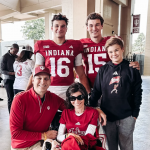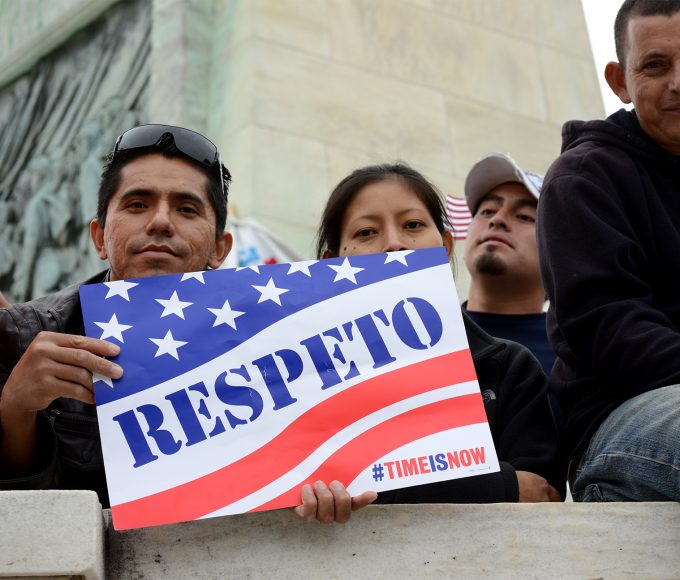Story Narration by Vicki Adame
The Mexican border town of Tijuana, where a U.S. military veteran calls home.
In the Mexican border town of Tijuana, Edwin Salgado sat on a folding chair cracking jokes with fellow U.S. military veterans on a Wednesday afternoon in mid-April. Salgado, 35, had just returned from a Mexican government office where he had helped one of the newest arrivals at this border shelter known as “the Bunker,” apply for an identification card.
He had lived in the United States since the age of three, when his parents brought him from Mexico. For three decades, he was a legal permanent resident. His green card allowed him to join the U.S. Marine Corps in 1999; citizenship is not necessary for enlistment.
Four years later, he found himself in a Middle East desert fighting in the second Iraq War. He received an honorable discharge in 2003 and moved back home to Southern California. He got work as a graphic designer, married and had a daughter.
“I think it’s bullshit. We’re good enough to send to war. We’re willing to give up our lives for our country. There are plenty of people who don’t serve.” Salgado said.
Because of a felony conviction on drug and weapons charges, however, his green card was revoked and he was deported last year after serving a prison sentence. Some days he finds himself at the Bunker, which is formally known as the Deported Veterans Support House in Tijuana, Mexico.
Salgado holds nothing back when asked how he feels about a country that allowed his deportation in the first place. “I think it’s bullshit. We’re good enough to send to war. We’re willing to give up our lives for our country. There are plenty of people who don’t serve. We mess up, do our time and then we get deported. It’s terrible. It really is and it needs to change,” Salgado said.
Dozens of deported veterans have found their way to this two-story converted storefront that sits next to a tire shop on Calle Juan Alvarez. With a brick façade and flag-covered windows, it’s the only resource for deported veterans in this border town across from San Diego, Ca. It’s a place where they can find help getting food, clothes and even a place to stay.
Salgado’s case is far from unique. Under U.S. law, any green card holder who commits an “aggravated felony” can be deported after serving his sentence. Military veterans are not exempt.A 2016 report by the ACLU of Southern California estimated that more than 250 veterans have been deported to 34 countries. The military estimates that 35,000 green card holders serve in the U.S. armed forces but does not track how many have been deported.
After completing his prison sentence, Salgado was released, but he never saw freedom. Instead he was detained by immigration authorities and placed in deportation proceedings.
Knowing the likely outcome, he tried to prepare himself as much as he could. He asked his mother and sister to bring him a few essential items – toiletries and some clothing – in a backpack. It was all he would be allowed to take with him.
“It’s like being dropped off in a room with the lights out and you have to find your way through the room and try to find the light switch and find everything,”
But, he said, nothing could have prepared him for what would happen on March 23, 2016 when U.S. immigration agents opened the gate at the U.S.-Mexico border and Salgado walked through, stepping foot in a country and world that was almost completely alien to him.
“It’s like being dropped off in a room with the lights out and you have to find your way through the room and try to find the light switch and find everything,” Salgado said. “Back home, I know where everything is.”
Even something as simple as taking the bus takes time to figure out. “You just stand in the street and wait for a bus to come by and hope it’s the one you need,” he said with a laugh.
A glimmer of hope surfaced this summer in the form of a bill introduced by Texas Congressman Vicente Gonzalez. In July, he introduced the Repatriate Our Patriots Act. It would allow deported veterans to return to the United States and prevent these deportations from occurring.
“I was shocked to learn we were deporting American veterans,” Gonzalez said. “It’s so shameful we treat American veterans this way. I feel like we breached their contract – they served honorably.”
He hopes to get the bill passed this legislative session.
Gonzalez learned about the issue when a veteran who lives in his congressional district in Texas was facing deportation. This man had served in Afghanistan, is a Purple Heart recipient, was injured and was suffering from PTSD, Gonzalez said. Three DUIs turned into a felony under the law, and this veteran found himself in deportation proceedings. Gonzalez said a federal judge stayed his deportation, but that could change at any moment.
Gonzalez acknowledges that green card holders who enlist can apply for expedited citizenship. “Most 18-year-olds, the last thing they think about is filling out immigration paperwork,” Gonzalez said. When the veterans are placed in deportation proceedings, they are not asked if they served in the military, he said. “We need to accept responsibility and take action in a bipartisan way,” Gonzalez said.
He also acknowledges the irony that under the law, regardless of whether they were deported or not, these veterans will be allowed to return one day. But that day is when they die and they are returned in a coffin for burial.
In the room that serves as a makeshift pantry and storage area, Hector Barajas is busy putting away the fruits and vegetables he just picked up at La Tinga – the local outdoor swap meet. It’s one of the many duties he performs as director of the Bunker.
Barajas, 40, served in the Army with the 82nd Airborne division from 1995 to 2001 as a paratrooper. When he was discharged, he returned home to Compton, Ca. And like many veterans he struggled to adjust to life outside the military. And this led to a run-in with the police. Court records show he was charged with firing a weapon from a car. In previous interviews, Barajas has said he was merely a passenger and did not fire the weapon. In 2002 he was sentenced to three years in state prison on the weapons charge, but he served half the sentence.
Like Salgado, he was placed into deportation proceedings and was deported in 2004 for 20 years. But Barajas returned to California. Then in 2010, he was stopped for a traffic violation and was deported on a lifetime ban on reentry.
He left behind his parents and his daughter. He suddenly found himself in a country he had not lived in since he was seven-years-old. Barajas got by with his less than fluent Spanish and he found work as a caretaker. Then three years after his deportation, he founded the Bunker as a way to help others like himself who were suddenly in a place that was foreign and overwhelming.
He says he understands what these men are going through. The Bunker began as a place where the veterans could live until they found a permanent home. But over the years it has become a resource center that provides mental health volunteers, food and clothing. Barajas also helps the veterans submit their paperwork for Veterans Affairs benefits and military pensions they may be eligible for. A veteran can receive benefits he is entitled to regardless of whether he lives in the US or overseas.
Andrew Deleon, 73 had been scraping by on $300 a month his sister would send him. But that changed when he found the Bunker. Barajas helped Deleon file the paperwork for his pension. At the end of 2016, Deleon began receiving a $1,000 monthly pension.
Barajas also continually works to bring attention to the plight of the deported veterans. On Veterans Day, Barajas gathered the troops at the Bunker. They were preparing to hold their own Veterans Day commemoration. Deleon sat on a couch talking amiably. Nearby, the Bunker’s newest addition – Boots – scampered for attention and belly rubs. Every now and then the white pooch was told to behave.
Soon it was time to head to their commemoration. They piled into three cars and made their way through the bustling Saturday morning streets to the U.S.-Mexico border. Wearing his military dress uniform, Barajas led a group of veterans and their supporters among the cars inching their way to the booths at the San Ysidro Port of Entry on the Tijuana side of the border. Along the way, he stopped to talk with the Mexican police patrolling the lanes to let them know what they were doing and how long they would be there. Occasionally an officer asked to take a photo with Barajas.
Barajas found a spot, a median separated by orange barricades, and unfurled a banner with the names and photos of veterans who had died while living outside the United States. The men were all deported veterans. The spot was a few hundred feet from the border crossing. And it was the closest the veterans could get to the United States.
They carried two flags – the flag of the country they fought for and that of the country they now lived in. The Mexican flag fluttered at the end of the pole. Jaime Perez held on to it. He wore black glasses to block out the sun. He’d recently had eye surgery. The 64-year-old served in the Marines. Because he served from 1971 to 1973, he is classified as a Vietnam era veteran.
Perez had lived in Los Angeles. He arrived in the United States as a four-year-old. In 2015 he was deported and left in Mexicali – a border town just east of Tijuana – by U.S. immigration agents with no money and no identification. Some people let him use their cell phone so he could call his family so they could wire him some money, he said. But another problem arose – with no identification he could not retrieve the money. He had to trust strangers and have the money wired in their name, Perez said.
“I’m blessed I have family to help out. There are a lot of veterans who have nobody,” Perez said. It was his family who helped him pay for the emergency eye surgery. As he stood among the cars heading back to the United States, Perez said, “I believe the government of the United States should support the veterans – not deport them. Everyone deserves a second chance.”
Back at the Bunker, Barajas also helps the vets find jobs. As the bright sun beamed down on a recent spring morning, Barajas sat at his desk, talking on the phone with a local call center that was looking for workers who are fluent in English. He asked about pay and hours writing down the information given to him.
A few hours later, Felix Peralta, 54, pushed past the white and black Veterans for Peace flag that serves as a curtain over the door and stepped into the main room that is both office and gathering spot. He held a manila folder and wore a big smile. Peralta had just returned from an interview with a call center and he had great news – he’d been hired.
Wearing blue jeans and a checkered shirt, fit and young-looking for his 54 years, Peralta said his deportation was the result of a drunk-driving stop that turned into resisting arrest. He did not go into much detail, but acknowledged a troubled past.
When he was first deported in 2001 he went to live in Culiacan, Mexico. He eventually made his way to Tijuana. He was homeless and living in a shelter when he met another veteran who took him to the Bunker.
In Barajas he not only found the support to move forward, but also a friend. “Hector motivates me. He always tells me, ‘Do something and stick with it.’ Now he is a good friend of mine. He’s like family. This is like home, too,” Peralta said. His new job will require some evening hours, so on the three nights a week he gets out late after the buses stop running and he has no way to get home, he will stay at the Bunker.
Unlike the others, Salgado never stayed at the Bunker. He lives with relatives in the Baja California oceanside town of Ensenada about an hour Barajas also continually works to bring attention to the plight of the deported veterans. Although he acknowledges the tremendous help Barajas has been when it comes to filling out paperwork, Salgado said sometimes just having someone to talk to has been the biggest help.
“It’s kind of hard to talk to people here in Mexico, because they have no idea what it’s like to grow up in a country and then one day to the next you’re in a completely different country,” Salgado said.
Words by Vicki Adame
To Read More INTELIGENCIA stories like this one, go here.
















Leave a comment